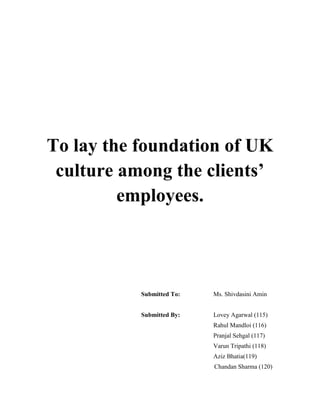customs and culture,UK
- 1. To lay the foundation of UK culture among the clientsâ employees. Submitted To: Ms. Shivdasini Amin Submitted By: Lovey Agarwal (115) Rahul Mandloi (116) Pranjal Sehgal (117) Varun Tripathi (118) Aziz Bhatia(119) Chandan Sharma (120)
- 2. ABSTRACT In todayâs globalized world, managers and employees travel to different corners of the world now and then for business. Hence, it is of utmost importance to understand the culture and the customs of Different countries. Our Organization comes up with an objective to train the employees to make them acquainted with Customs and culture of United Kingdom. We will use assessments to evaluate our employees and will provide certification on successful completion of the Program by the Employee. INTRODUCTION The Research Paper describes about Demography, Language, Clothing, Food and Preferences, Social Behavior, Work Culture, Dining Etiquettes, Dos and Donâts about United Kingdom. And as itâs a Sovereign of the countries of âEnglandâ, of âScotlandâ and of âNorthern Irelandâ so United Kingdom varies in the Demography Languages Spoken and Behavior of the People mainly. Considering the Diversity of United Kingdom itâs difficult to be familiar with their culture and customs but organizations try to make sure that their employees are well versed with all the customs to avoid any awkward situation that may arise because of unawareness of the same. Our Report covers all the important aspects of United Kingdom. The major factors are explained in brief as below: DEMOGRAPHY: The UK is an island nation in Western Europe just off the coast of France. The mainland areas lie between latitudes 49°N and 59°N and longitudes 8°W to 2°E.The UK lies between the North Atlantic Ocean and the North Sea, and comes within 35 km (22 miles) of the northwest coast of France, from which it is separated by the English Channel. Northern Ireland shares a 360 km international land boundary with the Republic of Ireland. According to the 2011 census, the total population of the United Kingdom is around 63,182,000. LANGUAGE: 250 languages are spoken in London, making the capital the most linguistically diverse city in the world. The United Kingdom does not have a constitutionally defined official language. English is the main and is thus the de facto official language. CURRENCY: The British currency is the pound sterling. The sign for the pound is ÂĢGBP = Great British Pound ÂĢ. The pound (ÂĢ) is made up of 100 pence. 1 British Pound Sterling equals 97.65 Indian Rupee. CLIMATE: Britain is an island country due to which it has a varied climate. Generally, we have warm summers and cool winters. The overall climate in England is called temperate maritime. This means that it is mild with temperatures not much lower than 0šC in winter and not much higher than 32šC in summer. It also includes various important aspects like Food and Preferences, Religion, Clothing, transport and Music Passion
- 3. EMPLOYMENT LAW AND WORK CULTURE: Children are not legally allowed to work until they are 13. Under-15s can work up to five hours on Saturdays (and weekdays in the summer holidays), to a maximum of 25 hours a week during school holidays. They can only work two hours maximum on schooldays and Sundays. Over-15s can work eight hours maximum on Saturdays and school holiday weekdays, and up to 35 hours a week during the holidays. SOCIAL BEHAVIOR: Report includes General Behavior, Terms of Endearment, No gender Biasing, Invitation, Gifting, Music Passion, Color Affection which majorly describes the social life of a Human Being. BEHAVIOUR AT WORK CULTURE: Report includes all the major things that helps you in Professional life such as Greetings under which comes Handshake, Eye Contact, Kiss and The Stiff Upper Lip. Also it includes Meeting etiquettes and Business Cards. EATING ETIQUETTES: The way you eat tells a lot about your personality and over the years countries have developed their own way of eating. We must respect their Eating etiquettes and best way it can be respected is by following those in the respective countries. Eating Etiquettes includes various things like Formal Dining(Doâs and Donâts on Dining Table), Cutlery soup etiquettes, Dessert Etiquettes, Tipping etc. METHOD We will be using Experiential culture-specific training methods to train the employees. There are various methods in experiential Method as given below which we will be incorporating in training to make the learning more effective: bicultural communication workshop. culture-specific simulation game. culture-specific role play. critical incidents exercise. case study CONCLUSION While cross-cultural training alone cannot guarantee successful adjustment to a novel culture, but studies suggests that relevant, honest, and updated training content generates more realistic expectations about life in the new environment. Also the Role of Cross-Cultural Training is vital as studies also warn that âif expatriates have insufficient or ambiguous information about the host country, they will use mental short cuts, such as stereotypes, to create expectations about it.â
- 4. Literature Cited We have used various sources as listed below: 1. http://www.legislation.gov.uk/ukpga/1996/18/contents( 15.08.2013) 2. http://resources.woodlands-junior.kent.sch.uk/customs/questions/#top( 15.08.2013) 3. http://projectbritain.com/ http://en.wikipedia.org/wiki/Culture_of_the_United_Kingdom ( 16.08.2013) 4. http://www.ukculture.info/index.php?page=culturecomparisons&videoid=10 (16.08.2013) 5. http://learnenglish.britishcouncil.org/en/uk-culture( 17.08.2013) 6. http://www.kwintessential.co.uk/resources/global-etiquette/uk.html( 17.08.2013) 7. http://www.tripadvisor.com/Travel-g186216-s202/United-Kingdom:Culture.html (17.08.2013) 8. www.legislation.gov.uk( 17.08.2013) 9. ( 17.08.2013)




